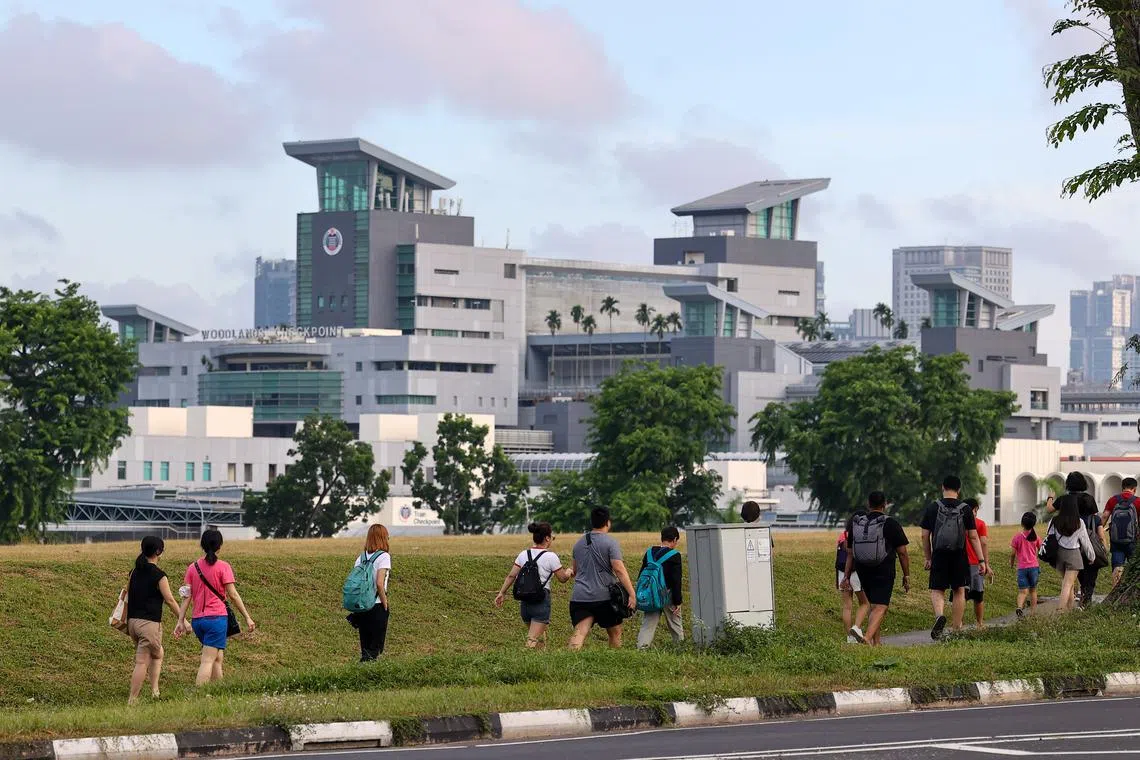SMEs can benefit from Johor-Singapore SEZ too: Alvin Tan
Sign up now: Get ST's newsletters delivered to your inbox

Minister of State for Trade and Industry Alvin Tan said the SEZ’s aims include facilitating goods flow and easing travel.
PHOTO: LIANHE ZAOBAO
Follow topic:
SINGAPORE – Heartland businesses here, as with other Singapore-based companies, can benefit from increased economic connectivity and comparative advantages when the Johor-Singapore Special Economic Zone (SEZ) comes into force.
Minister of State for Trade and Industry Alvin Tan said this in Parliament on May 8 in response to a question by Mr Henry Kwek (Kebun Baru) on how local small and medium-sized enterprises (SMEs) can be helped, should spending shift from Singapore to Johor.
Plans to set up the SEZ were formalised on Jan 11
Ideas mooted under the zone include a passport-free QR code system to speed up immigration clearance and a one-stop business and investment service centre in Johor to make it easier for Singapore businesses to set up shop there.
On May 8, Mr Tan reiterated the SEZ’s aims, which include facilitating goods flow, easing travel and strengthening the investment ecosystem in Johor.
Providing an update on SEZ discussions, Mr Tan reiterated that both sides were working towards an agreement and will provide an update to the 11th Singapore-Malaysia Leaders’ Retreat.
Prime Minister Lee Hsien Loong and Malaysian Prime Minister Anwar Ibrahim had agreed at the previous retreat here
Mr Tan said: “The Malaysian government is separately deliberating on the area and the sectors to be covered by the SEZ.”
The two countries have also continued discussions on early ideas, such as the passport-free QR code clearance and the one-stop service centre in Johor.
The Singapore Business Federation is working on a set of suggestions for how the development of the SEZ can be shaped, Mr Tan said.
As part of putting together this recommendation paper, the apex trade association is seeking views from the industry, he added.
The Government will continue to revitalise the heartland and help smaller enterprises transform and stay competitive, Mr Tan said.
He pointed to the Heartland Enterprise Placemaking Grant
The grant defrays up to 50 per cent of eligible cost for selected initiatives by these merchants, capped at $10,000 support per project.
Heartland businesses can also get support from the Heartland Enterprise Centre Singapore, which can provide them with business advisory services and upgrading programmes, he added.
Case for checkpoint expansion
Separately, Home Affairs Minister K. Shanmugam said the plans under way to expand the Woodlands Checkpoint by five times are to avoid frequent and reactive infrastructural adjustments down the road.
These adjustments would be costly and disruptive to checkpoint operations and travellers, he said in a written reply to a question by Non-Constituency MP Hazel Poa.
Ms Poa had asked why such a major expansion is required, when the number of daily travellers is expected to rise only between 33 per cent and 40 per cent by 2050.
Pointing out that actual increases in travellers have outstripped previous projections, Mr Shanmugam said additional buffers are needed to future-proof the checkpoint beyond 2050.
The additional space would also let the authorities move security checks of arriving vehicles farther away from populated areas, such that there would be less impact on Singaporeans and the rest of the checkpoint if something untoward were to happen, he added.
More space would also mean more holding areas to better contain traffic queues within the checkpoint, which will reduce congestion spillover onto nearby roads, Mr Shanmugam said.
He also noted that the redeveloped checkpoint will feature more automated lanes, including for cars, allowing the Immigration and Checkpoints Authority (ICA) to reduce its manpower needs.
This is critical as manpower is a “very serious constraint” for ICA, he added.
Correction note: In an earlier version of the story, we said that Minister of State for Trade and Industry Alvin Tan told Parliament that Singapore and Malaysia were working towards an agreement on the Johor-Singapore Special Economic Zone at the 11th Singapore-Malaysia Leaders’ Retreat. This is incorrect. It should be that both sides are working towards an agreement, and that an update will be provided at the leaders’ retreat. We are sorry for the error.

